ES6-JS进阶之面向对象-class
面向过程POP就是分析出解决问题所需要的步骤,然后用函数把这些步骤一步一步实现,使用的时候再一个一个的依次调用就可以了。 面向对象OOP是把事务分解成为一个个对象,然后由对象之间分工与合作。
# 一、面向对象导读
- 面向过程POP就是分析出解决问题所需要的步骤,然后用函数把这些步骤一步一步实现,使用的时候再一个一个的依次调用就可以了。
- 面向对象OOP是把事务分解成为一个个对象,然后由对象之间分工与合作。
两者比较
面向过程
- 优点:性能比面向对象高,适合跟硬件联系很紧密的东西,
- 缺点:不易维护、不易复用、不易扩展。
面向对象
- 优点:易维护、易复用、易扩展,由于面向对象有封装、继承、多态性的特性,可以设计出低耦合的系统,使系统 更加灵活、更加易于维护,
- 缺点:性能比面向过程低。
面向对象是把事务分解成为一个个对象,然后由对象之间分工与合作
举个栗子:将大象装进冰箱,面向对象做法
先找出对象,并写出这些对象的功能
- 大象对象 进去
- 冰箱对象 打开 关闭
- 使用大象和冰箱的功能
面向对象是以对象功能来划分问题,而不是步骤。

# 二、ES6中的类和对象
在 JavaScript中,对象是一组无序的相关属性和方法的集合,所有的事物都是对象,例如字符串、数值、数组、函数等。
现实生活中:万物皆对象,对象是一个具体的事物,看得见摸得着的实物。例如,一本书、一辆汽车、一个人可以是“对象”,—个数据库、一张网页、一个与远程服务器的连接也可以是“对象”.
对象是由属性和方法组成的
- 属性:事物的特征,在对象中用属性来表示(常用名词)
- 方法:事物的行为,在对象中用方法来表示(常用动词)
# 2.1 class 类
在ES6中新增加了类的概念,可以使用 class关键字声明一个类,之后以这个类来实例化对象。
类抽象了对象的公共部分,它泛指某大类(class) 对象特指某一个,通过类实例化一个具体的对象
面向对象的思维特点:
- 抽取(抽象)对象共用的属性和行为组织(封装)成一个类(模板
- 对类进行实例化获取类的对象
# 2.2 创建类
语法:
class name{
// class body
}
2
3
创建实例:
var foo = new name()
# 2.3 constructor 构造函数
constructor()方法是类的构造函数(默认方法),用于传递参数返回实例对象 过new命令生成对象实例时,自动调用该方法。如果没有显示定义,类内部会自动给我们创建一个 constructor()
# 2.4 创建第一个类和对象
// 1.创建类 class 创建一个明显类
class Star {
constructor(uname, age) {
this.uname = uname //this 指向创建的实例 this=>ldh
this.age = age
}
}
// 2.利用类创建对象
let ldh = new Star('刘德华', 18)
let zxy = new Star('张学友', 20)
console.log(ldh); // {uname: "刘德华", age: 18}
console.log(zxy); // {uname: "张学友", age: 20}
2
3
4
5
6
7
8
9
10
11
12
13
14
注意事项:
- 通过class 关键字创建类, 类名我们还是习惯性定义首字母大写
- 类里面有个constructor 函数,可以接受传递过来的参数,同时返回实例对象
- constructor 函数 只要 new 生成实例时,就会自动调用这个函数,如果我们不写这个函数,类也会自动生成这个函数
- 生成实例 new 不能省略
- 最后注意语法规范, 创建类 类名后面不要加小括号,生成实例 类名后面加小括号, 构造函数不需要加function
# 2.5 类中添加方法
注意事项:
- 类里边所有函数 不需要写 function 关键字
- 多个函数或者方法之间不需要加 ,(逗号)
// 1.创建类 class 创建一个明显类
class Star {
constructor(uname, age) {
this.uname = uname //this 指向创建的实例 this=>ldh
this.age = age
}
sing(song) {
console.log(this.uname + '唱' + song)
}
}
// 2.利用类创建对象
let ldh = new Star('刘德华', 18)
let zxy = new Star('张学友', 20)
console.log(ldh); // {uname: "刘德华", age: 18}
console.log(zxy); // {uname: "张学友", age: 20}
ldh.sing('冰雨') //刘德华唱冰雨
zxy.sing('李香兰') //张学友唱李香兰
2
3
4
5
6
7
8
9
10
11
12
13
14
15
16
17
18
19
# 2.6 注意事项
在Es6中类没有变量提升,所以必须先定义类,才能通过类实例化对象
类里面共有的属性和方法一定要加this使用
类里边的this指向问题
- constructor里面的this指向实例对象
- 方法里面的this指向这个方法的调用者
this指向问题案例:
var that;
var _that;
class Star {
constructor(uname, age) {
// constructor 里面的this 指向的是 创建的实例对象
that = this;
console.log(this);
this.uname = uname;
this.age = age;
// this.sing();
this.btn = document.querySelector('button');
this.btn.onclick = this.sing;
}
sing() {
// 这个sing方法里面的this 指向的是 btn 这个按钮,因为这个按钮调用了这个函数
console.log(this);
console.log(that.uname); // that.uname刘德华 that里面存储的是constructor里面的this
}
dance() {
// 这个dance里面的this 指向的是实例对象 ldh 因为ldh 调用了这个函数
_that = this;
console.log(this); //Star {uname: "刘德华", age: undefined, btn: button}
}
}
var ldh = new Star('刘德华');
console.log(that === ldh); //true
ldh.dance();
console.log(_that === ldh); // true
2
3
4
5
6
7
8
9
10
11
12
13
14
15
16
17
18
19
20
21
22
23
24
25
26
27
28
29
30
31
32
# 三、继承
现实中的继承:子承父业,比如我们都继承了父亲的姓
程序中的继承:子类可以继承父类的一些属性和方法。
继承中,如果实例化子类输出一个方法,先看子类有没有这个方法,如果有就先执行子类的方法,如果子类里面没有,就去查找父类有没有这个方法,如果有,就执行父类的这个方法(就近原 则)

# 3.1 语法
class Father{
//父类
}
class son extends father{
//子类继承父类
}
2
3
4
5
6
示例:
// 1.类的继承
class Father{
constructor(){
}
money(){
console.log(100);
}
}
class Son extends Father{
}
let son = new Son()
son.money() //100
2
3
4
5
6
7
8
9
10
11
12
13
14
# 3.2 super(超级的) 关键字
super关键字用于访问和调用对象父类上的函数。可以调用父类的构造函数,也可以调用父类的普通函数
示例:调用构造函数
class Father{
constructor(x,y){
this.x = x
this.y = y
}
sum(){
console.log(this.x + this.y)
}
}
class Son extends Father{
constructor(x,y){
// 这里不能访问父类的 this,父类的sum函数中的this是父类的,子类值没有传递进去
// this.x = x // 报错
// this.y = y // 报错
super(x,y);//调用父类中的构造函数
}
}
let son = new Son(1,2)
son.sum() // 3
2
3
4
5
6
7
8
9
10
11
12
13
14
15
16
17
18
19
20
21
示例:调用普通函数
// super调用父类的普通函数
class Father {
say() {
return '我是爸爸'
}
}
class Son extends Father {
say() {
//调用父类的普通方法
console.log(super.say()); //我是爸爸
}
}
let son = new Son()
2
3
4
5
6
7
8
9
10
11
12
13
# ### 3.3 继承方法的同时扩展方法
需求:继承父类的加法方法的同时,自己扩展一个减法方法。
注意事项:调用父类的函数时,super必须在子类this之前调用(父亲必须放在之前)
// 父类加法操作
class Father {
constructor(x, y) {
this.x = x
this.y = y
}
sum() {
console.log(this.x + this.y);
}
}
// 子类继承父类加法方法的同时扩展减法操作
class Son extends Father {
constructor(x, y) {
// 调用父类的构造函数 super必须在子类this之前调用(父亲必须放在之前)
super(x, y)
this.x = x
this.y = y
}
subtract() {
console.log(this.x - this.y);
}
}
let son = new Son(5, 3)
son.subtract() // 2
son.sum() // 8
2
3
4
5
6
7
8
9
10
11
12
13
14
15
16
17
18
19
20
21
22
23
24
25
26
27
# 四、Tab栏 案例
功能描述:
- 点击Tab栏能实现切换
- Tab栏和内容 点击右上角×号能删除当前栏目和内容
- 点击加号能实现增加Tab栏功能
- 双击Tab栏,可以编辑Tab栏名称
- 双击内容,可编辑内容
# 获取:
- 点此访问该Demo (opens new window)
- 你可以去蓝奏云下载: 面向对象案例.zip (opens new window) 的Demo文件
- 或观看文档底部的 实例代码!
是不是太棒了,在21世纪是不是 很久没有遇到博主这样贴心的人才了吧! 那还愣着干什么,
走一波啊!
# 4.1 点击Tab栏能实现切换 Tab栏和内容
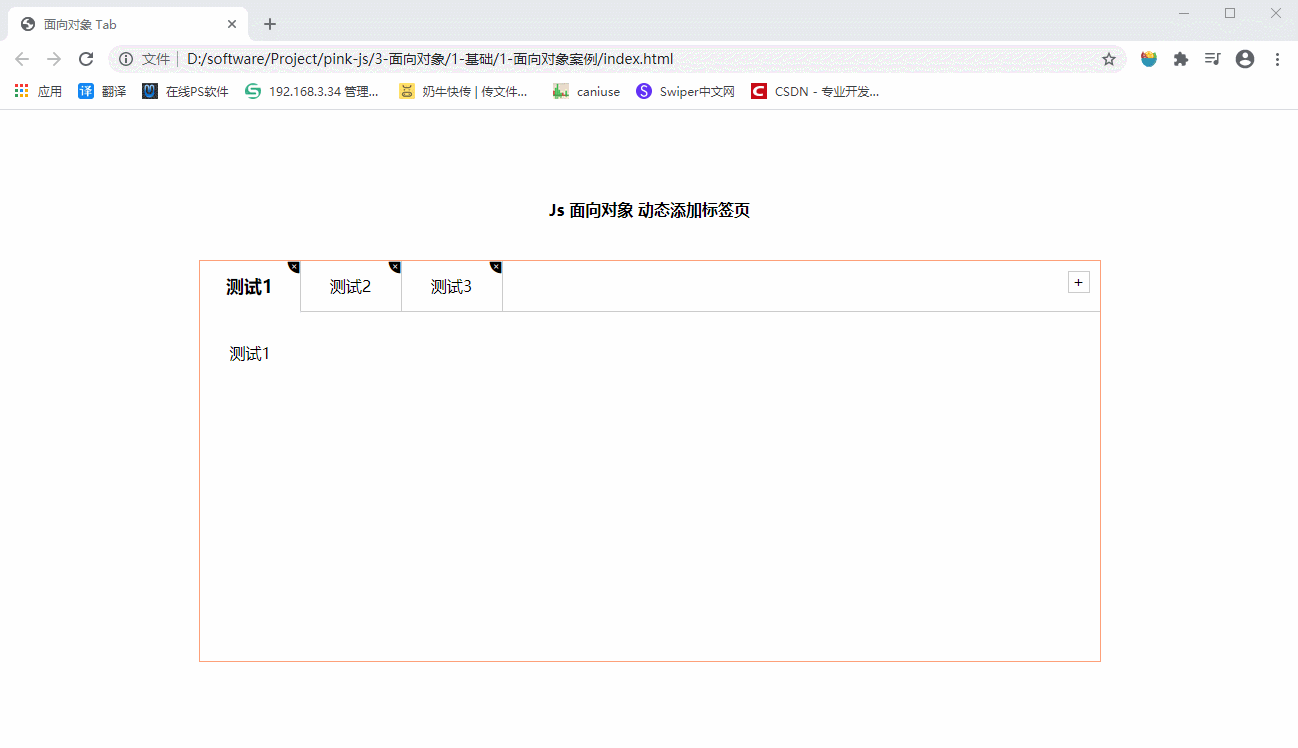
# 4.2 点击右上角×号能删除当前栏目和内容
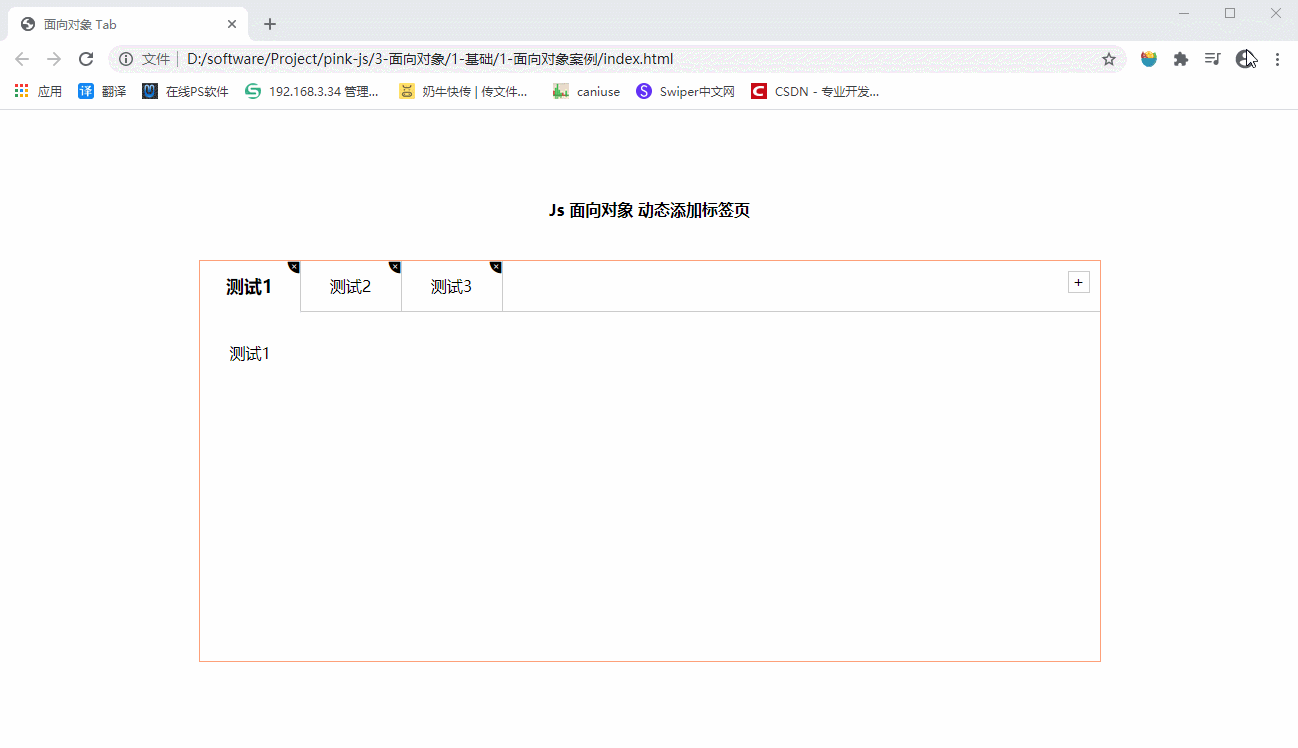
# 4.3 点击加号能实现增加Tab栏效果
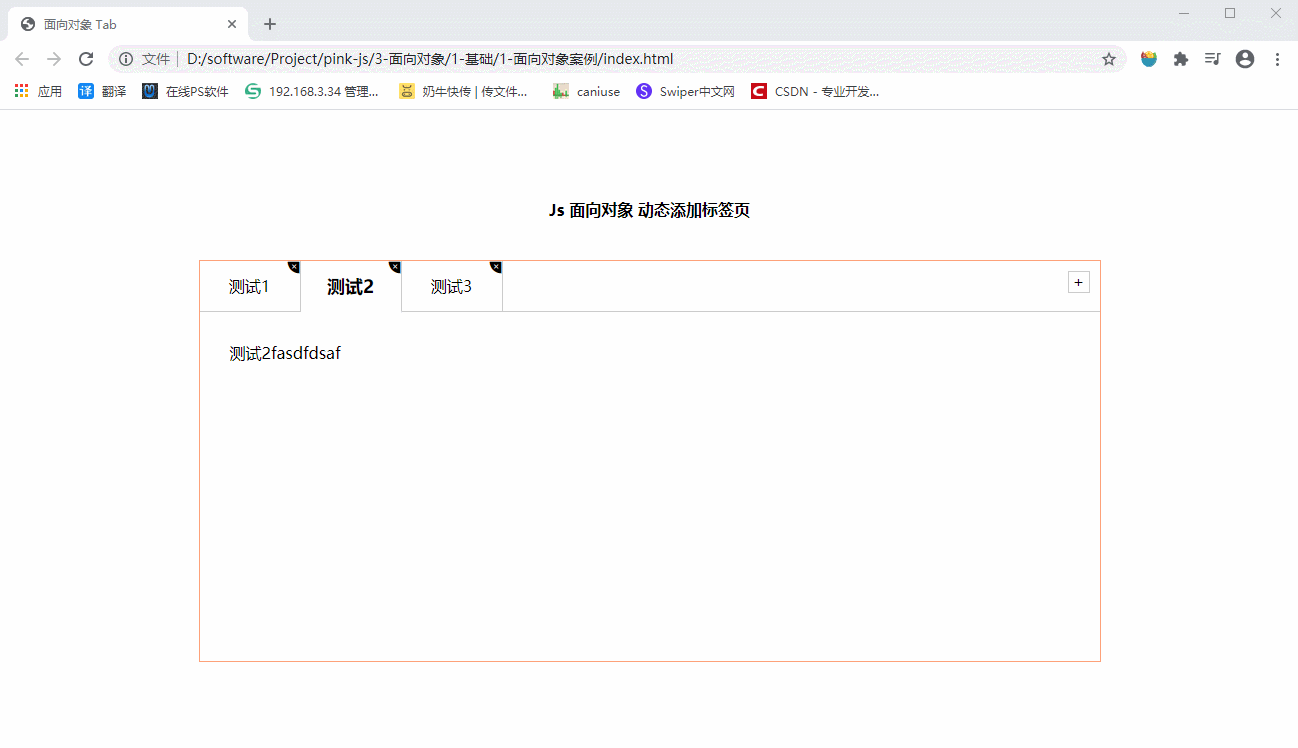
# 4.4 双击Tab栏,可以编辑Tab栏名称
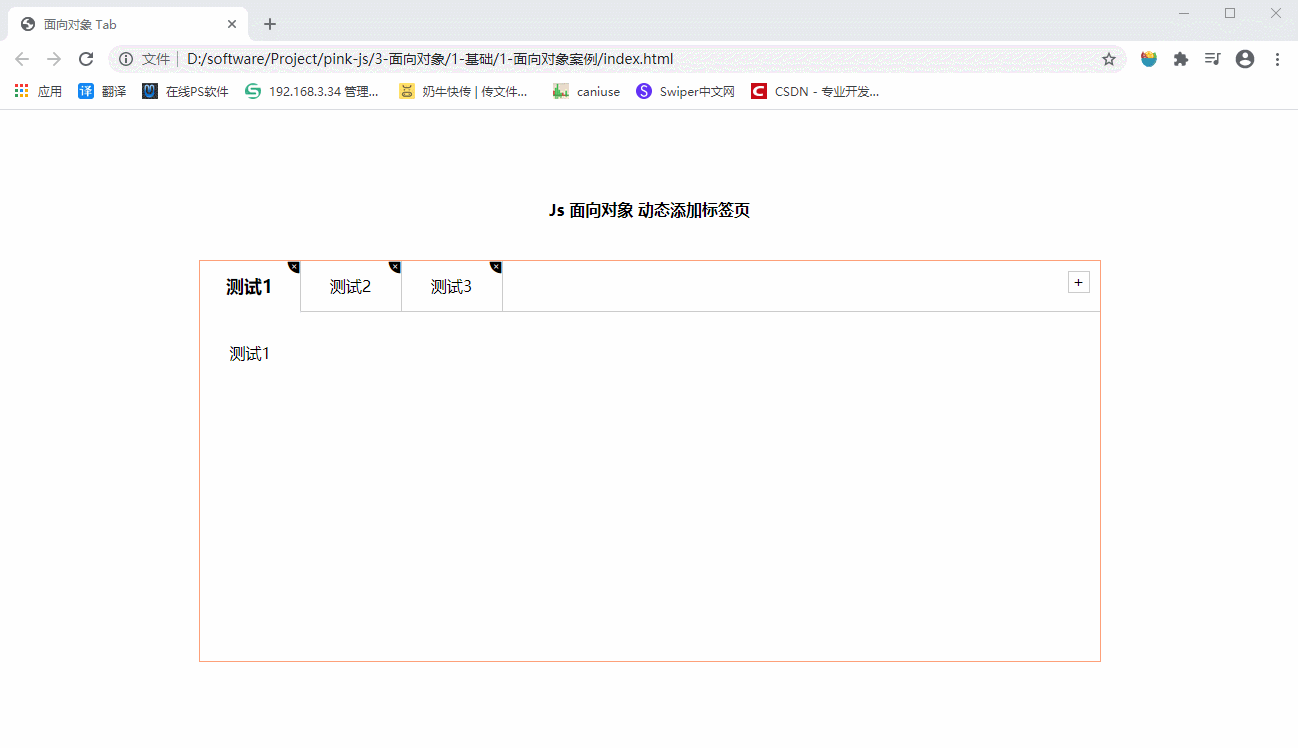
# 4.5 双击内容,可编辑内容
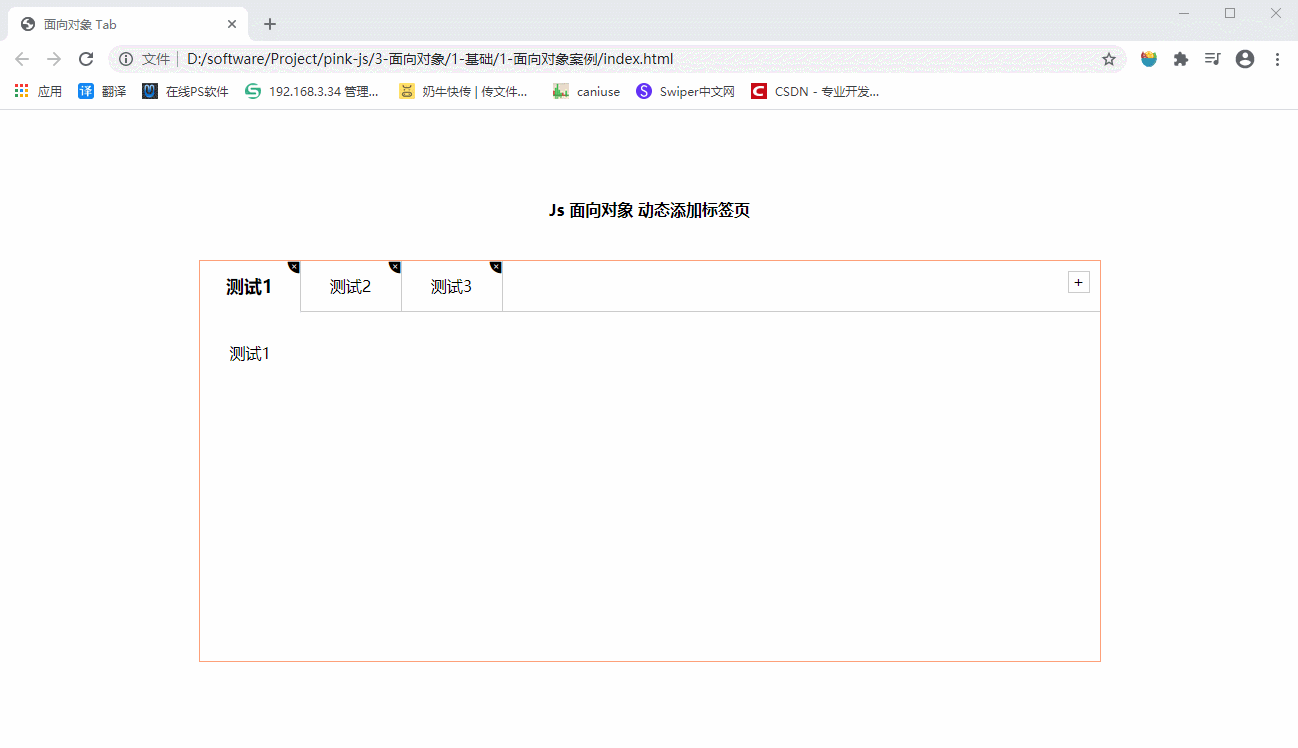
# 4.6 细节方面:
- 删除一个栏目后默认选中前一个栏目
- 新增的栏目也能实现基本功能
- 当默认选中的是第一个,并且删除的时候,选中删除后的第一个
- 在编辑Tab名称的时候,回车键也能确认编辑
- 新增的栏目默认选中
再说一遍: 点此访问该Demo (opens new window) 你可以去蓝奏云下载: 面向对象案例.zip (opens new window) 的Demo文件 或观看文档底部的 实例代码!
注意:该demo小图标用到了 阿里巴巴的 iconfont (opens new window) ,复制我贴出的代码会没有小图标哦!

JS部分:tab.js
let that = null
class Tab {
constructor(id) {
// 1.获取元素
this.main = document.querySelector(id)
this.tabadd = this.main.querySelector('.tabadd')
// li的父元素
this.ul = this.main.querySelector('.fisrstnav ul:first-child')
// section福元素
this.fatherSection = this.main.querySelector('.tabscon')
that = this
this.init()
}
// 初始化
init() {
this.updateNode();
// inti 初始化操作 让相关的元素绑定事件
for (let i = 0; i < this.lis.length; i++) {
this.lis[i].setAttribute('data-index', i)
this.lis[i].onclick = this.toggleTab;
this.remove[i].onclick = this.removeTab;
this.spans[i].ondblclick = this.editTab;
this.sections[i].ondblclick = this.editTab;
}
this.tabadd.onclick = this.add
}
// 更新数据列表
updateNode() {
this.lis = this.main.querySelectorAll('li')
this.sections = that.main.querySelectorAll('section')
this.remove = this.main.querySelectorAll('.icon-guanbi')
this.spans = this.main.querySelectorAll('.fisrstnav li span:nth-child(1)')
console.log('this.spans: ', this.spans);
}
// 1.切换功能
toggleTab() {
that.clearClass()
this.className = 'liactive'
that.sections[this.getAttribute('data-index')].className = 'conactive'
}
clearClass() {
for (let i = 0; i < this.lis.length; i++) {
this.lis[i].className = ''
this.sections[i].className = ''
}
}
// 2.添加
add() {
// 清除所有选中
that.clearClass()
// 1.创建 li元素和section元素
let random = Math.round(Math.random() * 100, 3)
let li = '<li class="liactive"><span>Tab</span><span class="iconfont icon-guanbi"></span></li>'
let section = '<section class="conactive">新内容' + random + '</section>'
// 2.追加元素 使用 insertAdjacentHTML 支持字符串形式
that.ul.insertAdjacentHTML('beforeend', li)
that.fatherSection.insertAdjacentHTML('beforeend', section)
// 更新
that.init()
}
// 3.删除
removeTab(e) {
// 阻止时间冒泡 防止触发li的点击切换事件
e.stopPropagation();
let index = this.parentNode.getAttribute('data-index')
// 根据索引号 删除对应li和section remove方法可以直接删除指定的元素
that.lis[index].remove()
that.sections[index].remove()
that.init()
// 当我们删除的不是选中状态的li的时候,原来的选定状态保持不变即可
// 该句核心思想,如果删除的是当前选中项,删除过后页面上没有 .liactive 进入判断,直接return 否则跳过
if (document.querySelector('.liactive')) return;
// 当我们删除过后,设置默认选中其一个
index == 0 ? index = 0 : index--
that.lis[index] && that.lis[index].click()
}
// 4.编辑
editTab(e) {
// 双击禁止选中文字
window.getSelection ? window.getSelection().removeAllRanges() : document.selection.empty();
let str = this.innerHTML;
console.log(this);
this.innerHTML = '<input type="text" value= />'
let input = this.children[0]
input.value = str
input.select() //文本框内的文字处于选定状态
// 按下回车
input.addEventListener('keyup', function (e) {
if (e.keyCode === 13) {
// 手动调用表单失去焦点事件
this.blur();
}
})
input.onblur = function () {
debugger
this.parentNode.innerHTML = this.value
}
}
}
#let tab = new Tab('#tab');
2
3
4
5
6
7
8
9
10
11
12
13
14
15
16
17
18
19
20
21
22
23
24
25
26
27
28
29
30
31
32
33
34
35
36
37
38
39
40
41
42
43
44
45
46
47
48
49
50
51
52
53
54
55
56
57
58
59
60
61
62
63
64
65
66
67
68
69
70
71
72
73
74
75
76
77
78
79
80
81
82
83
84
85
86
87
88
89
90
91
92
93
94
95
96
97
98
99
100
101
102
103
104
105
106
107
108
109
110
111
112
113
114
115
116
117
118
119
HTML部分:index.html
<!DOCTYPE html>
<html lang="en">
<head>
<meta charset="UTF-8">
<meta name="viewport" content="width=device-width, initial-scale=1.0">
<meta http-equiv="X-UA-Compatible" content="ie=edge">
<title>面向对象 Tab</title>
<link rel="stylesheet" href="./styles/tab.css">
<link rel="stylesheet" href="./styles/style.css">
</head>
<body>
<main>
<h4>
Js 面向对象 动态添加标签页
</h4>
<div class="tabsbox" id="tab">
<!-- tab 标签 -->
<nav class="fisrstnav">
<ul>
<li class="liactive"><span>测试1</span><span class="iconfont icon-guanbi"></span></li>
<li><span>测试2</span><span class="iconfont icon-guanbi"></span></li>
<li><span>测试3</span><span class="iconfont icon-guanbi"></span></li>
</ul>
<div class="tabadd">
<span>+</span>
</div>
</nav>
<!-- tab 内容 -->
<div class="tabscon">
<section class="conactive">测试1</section>
<section>测试2</section>
<section>测试3</section>
</div>
</div>
</main>
<script src="js/tab.js"></script>
</body>
</html>
2
3
4
5
6
7
8
9
10
11
12
13
14
15
16
17
18
19
20
21
22
23
24
25
26
27
28
29
30
31
32
33
34
35
36
37
38
39
40
41
42
43
44
CSS部分:tab.css
* {
margin: 0;
padding: 0;
}
ul li {
list-style: none;
}
main {
width: 960px;
height: 500px;
border-radius: 10px;
margin: 50px auto;
}
main h4 {
height: 100px;
line-height: 100px;
text-align: center;
}
.tabsbox {
width: 900px;
margin: 0 auto;
height: 400px;
border: 1px solid lightsalmon;
position: relative;
}
nav ul {
overflow: hidden;
}
nav ul li {
float: left;
width: 100px;
height: 50px;
line-height: 50px;
text-align: center;
#border-right: 1px solid #ccc;
position: relative;
cursor: pointer;
user-select: none;
}
nav ul li.liactive {
#border-bottom: 2px solid #fff;
z-index: 9;
}
nav ul li.liactive span:first-child{
font-size: 18px;
font-weight: bold;
}
##tab input {
width: 80%;
height: 60%;
}
nav ul li span:last-child {
position: absolute;
user-select: none;
font-size: 12px;
top: -18px;
right: 0;
display: inline-block;
height: 20px;
}
.tabadd {
position: absolute;
/* width: 100px; */
top: 0;
right: 0;
cursor: pointer;
}
.tabadd span {
display: block;
width: 20px;
height: 20px;
line-height: 20px;
text-align: center;
#border: 1px solid #ccc;
float: right;
margin: 10px;
user-select: none;
}
.tabscon {
width: 100%;
height: 300px;
position: absolute;
padding: 30px;
top: 50px;
left: 0px;
box-sizing: border-box;
#border-top: 1px solid #ccc;
}
.tabscon section,
.tabscon section.conactive {
display: none;
width: 100%;
height: 100%;
}
.tabscon section.conactive {
display: block;
}
2
3
4
5
6
7
8
9
10
11
12
13
14
15
16
17
18
19
20
21
22
23
24
25
26
27
28
29
30
31
32
33
34
35
36
37
38
39
40
41
42
43
44
45
46
47
48
49
50
51
52
53
54
55
56
57
58
59
60
61
62
63
64
65
66
67
68
69
70
71
72
73
74
75
76
77
78
79
80
81
82
83
84
85
86
87
88
89
90
91
92
93
94
95
96
97
98
99
100
101
102
103
104
105
106
107
108
109